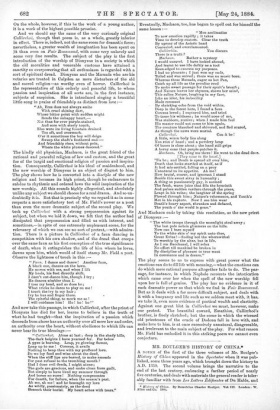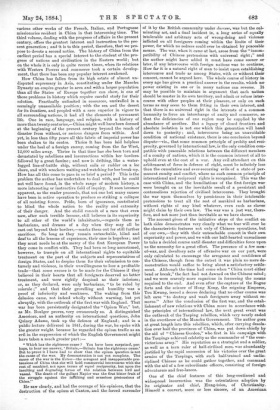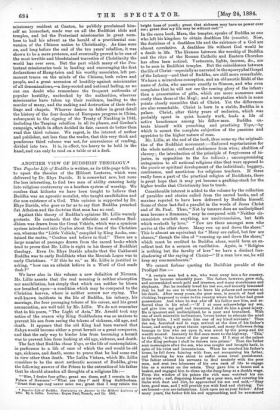MR. BOULGER'S HISTORY OF CHINA.*
A NOTICE of the first of the three volumes of Mr. Boulger's History of China appeared in the Spectator when it was pub- lished, some three years ago, which brought down the history to A.D. 1350. The second volume brings the narrative to the end of the last century, embracing a further period of nearly five centuries, and deals with materials the general reader is toler- ably familiar with from Les Lettres Adifiantes of Dn Halde, and • History of China. By Demetrius Charles Boulger. Vol. III. London : W. Allen and Co. Mt.
various other works of the French, Italian, and Portuguese missionaries resident in China in that intervening time. The third volume, dealing with the progress of affairs in the present century, offers the greatest interest and instruction to the pre- sent generation ; and it is to this period, therefore, that we pro- pose to devote a second notice. The history of China from the earliest period has a special interest to the student of the pro- gress of nations and civilisation in the Eastern world ; but on the whole it is only in quite recent times, when its relations with Western Powers and commerce took a certain develop- ment, that there has been any popular interest awakened.
How China has fallen from its high estate of almost un- disputed supremacy in Asia, constituting under the Manchu Dynasty an empire greater in area and with a larger population than all the States of Europe together can show, is one of those problems in history which require careful study for their solution. Practically unlimited in resources, unrivalled in a seemingly unassailable position ; with the sea and the desert for its frontiers, and peopled with a race superior in vigour to all surrounding nations, it had all the elements of permanent life. One in race, language, and religion, with a history of more than twenty centu ries,—China might well have been deemed at the beginning of the present century beyond the reach of disaster from without, or serious dangers from within. And yet, in less than fifty years all this fabric of imperial power has been shaken to its centre. Thrice ft has been laid helpless under the heel of a foreign enemy, coming from the far West, 12,000 miles away. Thrice in that time has she been torn and devastated by rebellions and insurrections within her borders, followed by a great famine ; and now is drifting, like a water- logged line-of-battle ship, without sails or rudder on a lee shore, and with wreckers waiting and watching for her break-up.
How has all this come to pass in so brief a period P This is the problem the author has undertaken to deal with, and he could not well have found, in the whole range of modern history, a more interesting or instructive field of inquiry. It soon becomes apparent, as the reader proceeds, that not one but many causes have been in active operation to produce so striking a collapse of all resisting forces. Pride, born of ignorance, contributed to blind the whole nation to the reality and extremity of their danger. And the stolid conceit of a race that even now, after such terrible lessons, still believes in its superiority to all other of the world's inhabitants,—regards them as barbarians, and dreams of a day when they may all be cast out beyond their borders,—marks them out for still further sacrifices. So long as they remain unteachable, blind and deaf to all the lessons of experience, their case is hopeless ; and they must needs be at the mercy of the first European Power they come in conflict with. They had been so long accustomed, however, to trample on all international rights to equitable treatment on the part of the subjects and representatives of foreign States, and to despise them for their submission to con- tumely and violence, in their unwillingness to lose a profitable trade—that some excuse is to be made for the Chinese if they believed in their hearts that all foreigners deserved no better treatment, and were rightly despised as their inferiors ; or, as they declared, were only barbarians, " to be ruled by misrule ;" and that their grovelling and humility was a proof of inferiority and weakness. The waking from this delusion came, not indeed wholly without warning, but yet abruptly, with the outbreak of the first war with England. That war has been persistently designated the " Opium War," but, as Mr. Boulger proves, very erroneously so. A distinguished American, and an authority on international questions, John Quincy Adams, took up the defence of England ; and in a public lecture delivered in 1841, during the war, he spoke with the greater weight because he regarded the opium traffic as an evil in the suppression of which the English Government might have taken a much greater part :—
" Which has the righteous cause P You have been surprised, per- haps, to hear me answer, 'Britain,—Britain has the righteous cause.' But to prove it I have had to show that the opium question is not the cause of the war. My demonstration is not yet complete. The cause of the war is the Kotow—the arrogant and insupportable pre- tensions of China that she will hold commercial intercourse with the rest of mankind, not upon terms of equal reciprocity, but upon the insulting and degrading forms of the relation between lord and vassal. The death of the gallant Napier was the first bitter fruit of the struggle against the ingtilting and senseless pretensions of China."
He saw clearly, and had the courage of his opinions, that the destruction of the opium at Canton, and the forced surrender
of it by the British community tinder duresse, was but the cul- minating act, and a final incident in, a long series of equally intolerable and arbitrary acts of wrong-doing and violence inflicted on all foreigners coming within the limits of their power, for which no redress could ever be obtained by peaceable- means. The war, when it came at last, arose from the "incom- patibility of Chinese pretensions with universal right ;" and the author might have added it must have come sooner or later, if any intercourse with foreign nations was to continue_ How far it is a natural right of man to insist upon establishing intercourse and trade as among States, with or without their consent, cannot be argued here. The whole course of history in every age has given a practical answer in the results, which ne power existing in one or in many nations can reverse. It may be possible to maintain in argument that each nation should be master in its own territory, and admit or refuse inter- course with other peoples at their pleasure, or only on such terms as may seem to them fitting in their own interest, and that there is no universal right in the interests of a common humanity to force an interchange of amity and commerce, so that the deficiencies of one region may be supplied by the abundance of another. But a legacy of closed frontiers and absolute isolation is not one which this generation will hand down to posterity ; and, intercourse being an unavoidable condition of- national existence, there is one conclusion beyond dispute—viz., that some common principle of probity and reci- procity, governed by international law, is the only condition com- patible with peaceable relations between the different members of a comity of nations, which it is the common interest of all to uphold even at the cost of a war. Any evil attendant on this arbitrament of force in defence of right, must be infinitely less- than the cumulative and ever-recurring evils of a state of per- manent enmity and conflict, where no such common principle of international and reciprocal rights is recognised. This was the case with China, and the humiliations of the first foreign war were brought on as the inevitable result of a persistent and• contumelious rejection of civilised intercourse. They brought the war upon themselves by persistence in their intolerable pretensions to treat all the rest of mankind as barbarians, without rights of any kind whatever, even such as slaves might claim by their own law. The war was a just war, there- fore, and not more just than inevitable as we have shown.
The account given of the initiative steps of the conflict on both sides demonstrates very clearly what we fear will ever be• the characteristic features not only of Chinese operations, but of our own,—they with their unteachable conceit in their own superiority and power, and we with our half-hearted unreadinese, to take a decided course until disaster and difficulties force upon.
us the necessity for a great effort. The presence of a few men- of-war, and desultory acts of offensive war on our part, were only calculated to encourage the arrogance and confidence of the Chinese, though from the outset it was plain no mere de- monstration would suffice to bring about a satisfactory settle- ment. Although the time had come when "China must either- bend or break," the fact had not dawned on the Chinese mind; and we were scarcely more sagacious in foreseeing the means required to the end. And even after the capture of the Bogue- forts and the seizure of Hong Kong, the reigning Emperor, Tou Kwang, issued a decree declaring that no other course was- left save " to destroy and wash foreigners away without re- morse." After the conclusion of the first war, and the estab- lishment of new relations with China more in accordance with the principles of international law, the next great event was the outbreak of the Taeping rebellion, which very nearly ended in the overthrow of the Manchu Government. The author goes at great length into this rebellion, which, after carrying desola- tion over half the provinces of China, was put down chiefly by the aid of " Chinese Gordon," who first in his campaign with the Taepings achieved celebrity as the commander of "the ever- victorious army." His reputation as a strategist and a soldier,. as well as a born ruler of half-civilised men, was abundantly justified by the rapid succession of his victories over the great armies of the Taepings, with such half-trained and undis- ciplined Chinese as he could gather together, and command with the aid of a few subordinate officers, consisting of foreign adventurers and free-lances.
One of the chief features of this long-continued and widespread insurrection was the ostentatious adoption by its originator and chief, Hung-tsien, of Christianity. Himself a convert, more or less sincere, of an American missionary resident at Canton, he publicly proclaimed him- self an Iconoclast, made war on all the Buddhist idols and temples, and led the Protestant missionaries in great num- bers to hail his advent as the herald of a providential con- version of the Chinese nation to Christianity. As time wore on, and long before the end of the ten years' rebellion, it was shown to be a mere pretence, and eventually proved to be one of the most terrible and bloodstained travesties of Christianity the world has ever seen. But the part which many of the Pro- testant missionaries took in lauding and encouraging the first declarations of Hang-tsien and his worthy associates, left per- manent traces on the minds of the Chinese, both rulers and people, and a great accession of hostility against missionaries of all denominations,—a deep-rooted and national feeling, as no one can doubt who remembers the frequent outbreaks of popular hostility, unchecked by the authorities, wherever missionaries have taken up their residence, leading to the murder of many, and the sacking and destruction of their dwel- lings and chapels. Whoever desires to follow in great detail the history of the four decades of European progress in China, subsequent to the signing of the Treaty of Nanking in 1842, including the Taeping rebellion in all its phases, and Gordon's campaign, which in effect decided its fate, cannot do better than read this third volume. We regret, in the interest of author and publisher, not less than the reader, that this very thick and ponderous third volume was not, for convenience of reading, divided into two. It is, in effect, too heavy to be held in the hand, and can only be read on a table or at a desk.


































 Previous page
Previous page